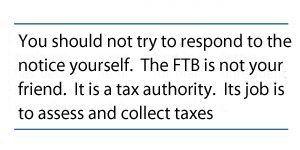It’s that time of year again. The time when the Franchise Tax Board sends out its 4600 Notices, “Request for Tax Return,” the bane of snowbirds and other part-time residents of California, especially those with vacation homes. And a potential trap for the unwary.
What Is A 4600 Notice?
A 4600 Notice is sent by the FTB because it believes the recipient, usually a nonresident, was required to file a California tax return, but didn’t. The notice usually goes out a month or two after the April 15 tax filing deadline, but it can show up any time after that, even years later. There is no statute of limitations. As a practical matter, however, the FTB generally sends the notice within a short period after the tax filing deadline or not at all. That’s because, as explained below, the notice is usually triggered by information provided by third parties (such as banks, mortgage lenders, employers) in the same tax year at issue.
The notice requires you to file a return, or explain why you are exempt. It’s usually directed at nonresidents, who for various reasons discussed below, have the misfortune of popping up on the FTB’s radar scope.
Why Did You Get A 4600 Notice?
When I say the FTB believes a nonresident was supposed to file a California tax return, I’m speaking metaphorically. 4600 Notices are mostly sent out through an automated system. No thinking is involved. The typical scenario goes like this. You’re a nonresident who doesn’t file a California tax return because you don’t live in California and didn’t have any California source income. But you do have a mortgage on your vacation home, or a small local bank account that bears interest, or you work remotely for a California firm which for convenience sake uses your local address for correspondence. As a result, the bank, lender or employer sends a Form 1099-INT (bank interest) or Form 1098 (mortgage interest) or a Form W-2 (wage income) to Sacramento with your name and local address on it. Come April 15th, FTB computers cross-reference these “information returns” with filed tax returns. When nothing comes up, a 4600 Notice issues.
There are other situations that trigger a 4600 Notice, but the scenario is mostly similar: a third party sends some sort of information return to the FTB with your name on it, while a cross-reference of filed returns comes up empty. By the way, this is why it’s important for nonresidents with vacation homes to do some planning and take steps to avoid this scenario.
How Do You Know What Triggered Your 4600 Notice?
The notice comes in various flavors: 4600B, 4600C and so forth, depending on the type of information the FTB received that triggered the inquiry. The capital letter is a code to indicate whether the cross-reference is to a Form 1099, 1098, W-2, or some other document sent to Sacramento. You can find the form number on the bottom left of the “Reply” section of the notice. But it’s usually obvious: on the first page the FTB will provide a summary of why it sent the notice.
What Is The Purpose Of The 4600 Notice?
The stated purpose of the 4600 Notice is to prod recipients (again, usually nonresidents) to either file a tax return for the year at issue or provide a sufficient explanation of why they aren’t required to. That’s a legitimate tax administration purpose, as far as it goes. But in fact what the FTB also wants to know is your gross income, which is usually inquired into in various ways in Section B, Item G of the Reply. Needless to say, whether you make $1 million a year or $30,000 bears some relevance to how eager the FTB might be to audit you.
What To Do About A 4600 Notice?
First, it’s important to emphasize what not to do: Do not ignore the notice. There is a deadline in bold letters on the first page. It’s usually about a month from the mailing date. If you don’t reply by that deadline, the FTB will likely initiate a full audit or simply issue a proposed tax assessment which will assume facts about your income most unfavorable to you. At that point, you will have to protest/appeal the proposed assessment, which can be an expensive and lengthy process – at the very least it is much more burdensome than responding to the notice with care and in a timely fashion. The FTB also usually grants an extension to respond if you ask.
Unfortunately, 4600 Notices are often sent to a nonresident’s vacation home. Indeed it is usually because a California address was used for the various tax information documents mentioned earlier that the notice issued in the first place. And often it takes more than a month for the mail to be forwarded to the nonresident’s out-of-state address. Or the vacation homeowner may have made no provision for forwarding the mail at all. If that’s the case, the nonresident may wind up with a proposed tax assessment by default.
Second, you should not try to respond to the notice yourself. The FTB is not your friend. It is a tax authority. Its job is to assess and collect taxes. To respond properly, you need to understand the extent of your potential tax liability as a nonresident and the facts that may exempt you from California’s tax filing requirements altogether. The FTB is not going to cut you any slack for responses that are insufficient or careless; it will simply proceed with a full audit or a proposed assessment.
So the prudent thing to do is to take the notice to your CPA or tax attorney. In some cases, you may in fact have to file a nonresident tax return (Form 540NR), because you have received California-source income, often without thinking about it as taxable by California. This might only involve a minor amount of tax, though it may have other downsides (such as alerting the FTB about your gross income). In most cases, however, a proper description of the facts and circumstances which demonstrate nonresidency and which explain why the 1099 or other information document was sent to the FTB is enough to forestall an audit. That task is best left to your tax professional. There is nothing intuitive about legal residency. It’s a matter of rules, often obscure ones.
What Happens Next?
If you don’t have any California-source income and you’re a nonresident, and if you respond to the notice properly, the FTB should send you a release letter a month or two later. However, it’s possible that the FTB isn’t satisfied with your explanation or the facts are ambiguous enough to suggest you might be a California resident. In that case, the FTB will follow up with a request for further documents and information. At that point you are in a full-blown residency audit and you should seek legal counsel.
The good news is the vast majority of 4600 Notices do not result in audits. The ones that do, however, usually involve nonresidents who ignore the notice, don’t timely respond for some reason or other, or try to respond without professional counsel. The notice can lead to a lengthy and expensive audit or a large tax liability if not handled correctly. It should be treated seriously.
____________________________
Manes Law has a decades-long record of success in assisting 4600 Notice recipients, from vacation-home owners to out-of-state members of California LLCs to professional athletes, respond in a way that averts a full-blown audit. Almost 100% of our 4600 Notice clients receive a “release letter” from the FTB, ending the inquiry. Learn more at our website: www.calresidencytaxattorney.com.
 California Residency Tax Planning
California Residency Tax Planning


